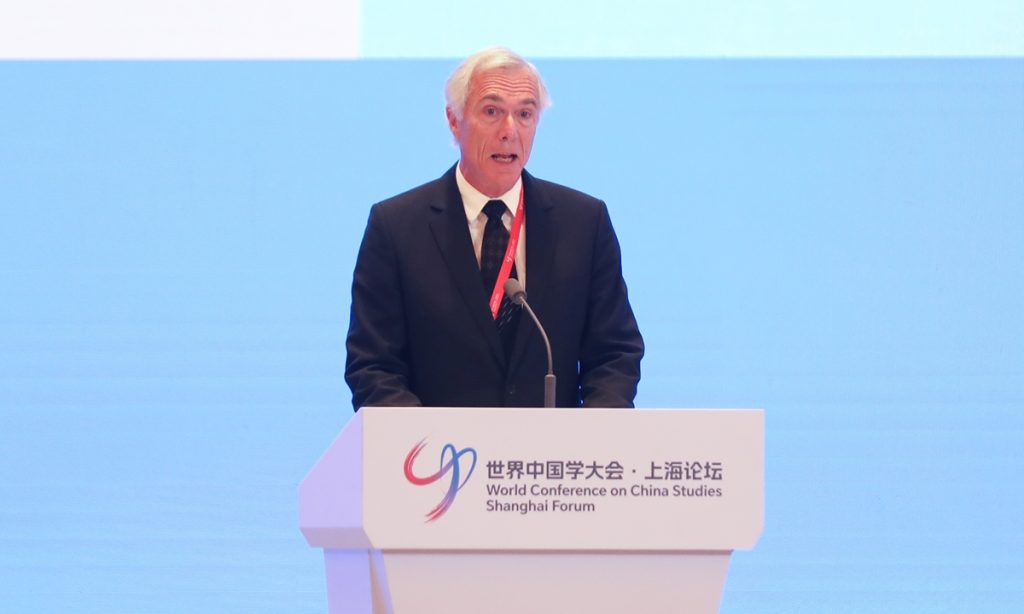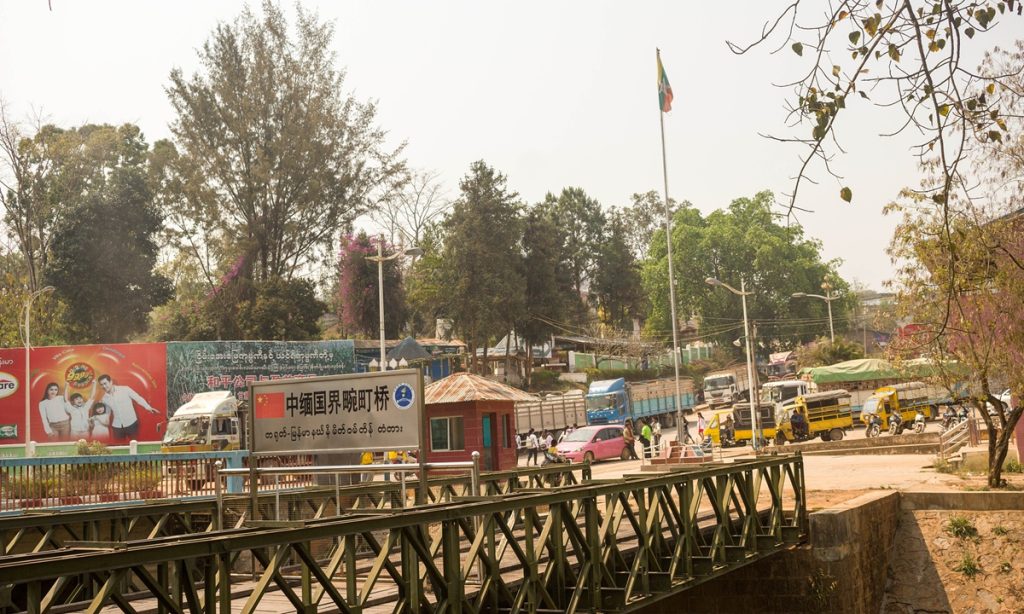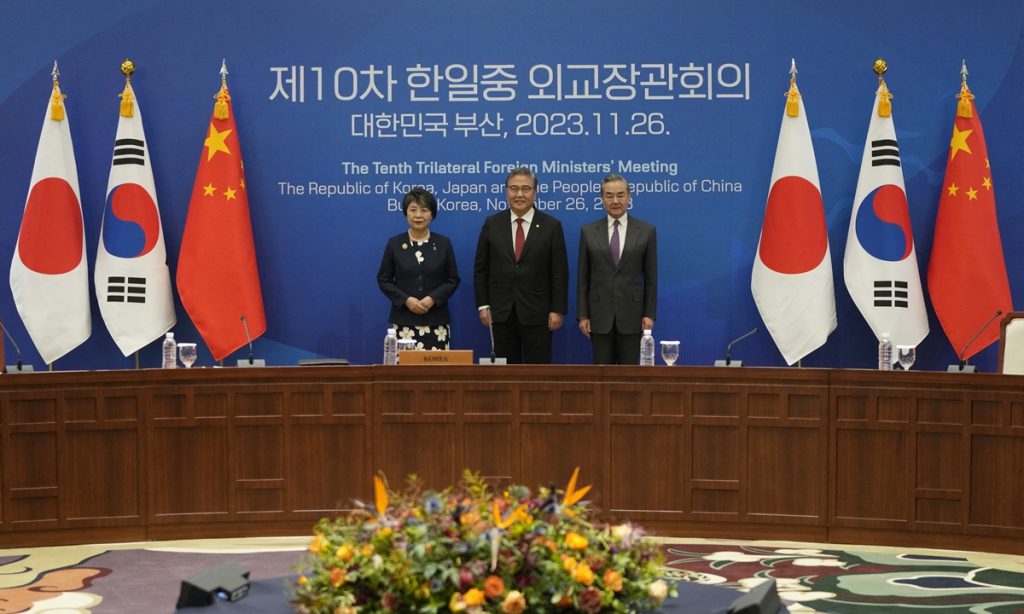Winners of 2023 Award for Distinguished Contributions to China Studies share observations, insights on Chinese civilization
Timothy Brook visited China for the first time in the 1970s, and has returned to the country many times since then to conduct deep exchanges with Chinese scholars. A specialist in Chinese history, Brook is particularly fascinated by the Ming Dynasty (1368-1644), and has published several books and academic papers on the topic over the decades. His latest book, The Price of Collapse: The Little Ice Age and the Fall of Ming China, was published by Princeton University Press in November. “One of the reasons why I’m so interested in the Ming Dynasty is that it was the beginning of the dialogue between China and Europe that continues to this day,” Brook said, speaking in fluent Chinese, on Thursday. “Europeans began to come to China in the 16th century,” he noted. A broad global context Unlike a lot of other China scholars, Brook’s observations usually situate China in a broad global context, and present the connection between China and the West. “China and the world should understand each other better,” said Brook, noting that both Westerners and Chinese people should understand their history differently. He suggested that today’s young international scholars should look at China in a more global context, especially in the era of globalization, when mutual learning among civilizations matters greatly. “You have to not only immerse yourself in Chinese culture and language, but also immerse yourself in the world – use the knowledge of where you come from, and bring that to bear on the knowledge that you gain about China,” Brook told the Global Times. However, doing this is “not easy.” Hailed as one of the best storytellers among North American historians, Brook has found a broad readership both in China and overseas for his many books, such as The Confusions of Pleasure: Commerce and Culture in Ming China and Vermeer’s Hat: The Seventeenth Century and the Dawn of the Global World. The books open a window for international readers to learn more about Chinese history and civilization. “I keep writing books about China in order to increase the outside world’s understanding of China,” said Brook. It’s important to let foreigners know that Chinese history is not something far away, strange or difficult to understand, he noted. For Chinese readers, Brook’s observations and insights offer a precious “outsider” perspective. “Even though I will never fully understand China as an ‘insider’ does, this ‘outsider’ has crafted ideas and insights that may help us to achieve a more objective and universal knowledge of China, and not just of China on its own terms and for itself, but of China as part of the world, which is, after all, where we all live,” Brook said in an acceptance speech at the forum on Friday. Looking through Baik Young-seo’s books and academic papers, “East Asia” is probably one of the most frequently mentioned terms. As the first South Korean scholar to win the Award for Distinguished Contributions to China Studies, Baik adds a valuable South Korean perspective to the world’s current China studies, much of which is based on observations from the West. “Compared with countries in other areas like Latin America or Europe, countries in East Asia share more common ground among civilizations,” Baik said on Thursday, in response to a question raised by the Global Times. East Asian countries enjoy some common civilization assets, Baik said. Nonetheless, “[We should] not only explore which of the assets can be shared, but also make greater efforts in analyzing and researching which of the assets can help the actual development of this area,” he said. Baik recalled that after 1992, when China and South Korea established diplomatic relations, exchanges between the two countries became increasingly frequent, which enhanced regional thinking on East Asia. Since then, Baik has studied the history and reality of China from an East Asian perspective. Baik Young-seo Photo: Huang Lanlan/Global Times ‘Inclusiveness and flexibility’ Baik has served as president of the Korean Association for Contemporary Chinese Studies and the Korean Association for Studies of Modern Chinese History. His major books, including Returning of East Asia and East Asia as Intellectual Thought, have had a wide influence on the academic community of China studies in both China and South Korea. “What I like most about Chinese civilization is its inclusiveness and flexibility,” said Baik. East Asian countries should “respect each other’s differences, eliminate contradictions, and enhance their ability to listen to each other,” he told the Global Times. “In the early 1970s, I became interested in China mainly because I wanted to reflect on South Korea by learning from China,” he said in fluent Chinese in an acceptance speech at the forum on Friday. Nowadays, China studies needs mutual learning and a reference to related countries including South Korea, he added. Having been to China many times, Baik has built good friendships with Chinese scholars in recent decades. He said that in China, he sometimes enjoys hot pot and Chinese liquor with Chinese historians such as Xu Jilin, who was also present at the event on Thursday. “I do not study China’s history and modern reality from the perspective of a ‘spectator,’” Baik said. “I’m a participant.”
PLA conducts drills on border as conflicts continue in north Myanmar
CHINA / DIPLOMACY PLA conducts drills on border as conflicts continue in north Myanmar Drills aimed at dealing with emergencies, send message of deterrence: observer By Yang Sheng and Xu YeluPublished: Nov 26, 2023 08:55 PM Photo: CFP Live-fire drills and training exercises conducted by the Chinese military force along the Chinese side of the China-Myanmar border are defensive and aimed at safeguarding Chinese sovereignty, stability of border area and safety of personnel from impacts caused by the civil war in Myanmar, rather than an act to intervene in the internal affairs of the neighboring country, experts said on Sunday. The Chinese People’s Liberation Army (PLA) Southern Theater Command announced on Saturday that it will conduct a series of real combat training and drills along the Chinese side of the China-Myanmar border, which is aimed to test the rapid maneuverability, border sealing and firepower capabilities of the military units of the theater command. In accordance with the annual training plan, the PLA Southern Theater Command organized its army units to conduct “live-fire drills starting from Saturday along the Chinese side of the China-Myanmar border,” according to Senior Colonel Tian Junli, a spokesperson of the PLA Southern Theater Command. “The theater command forces are always prepared to respond to various emergencies and are resolute in safeguarding national sovereignty, border stability and the safety of the people’s lives and property,” Tian said in a statement released by the official account of the PLA Southern Theater Command. The PLA Daily on Sunday published a commentary which said that “Recently, due to many reasons, military conflicts have broken out in multiple regions of north Myanmar, causing casualties and severe security situation.” Since the latest outbreak of armed conflict in Myanmar, apart from calling for peace and a cease-fire, China is making great efforts to work with Myanmar to place and help evacuees, and also to help nationals from the third party to evacuate from Myanmar through China, according to the Chinese Foreign Ministry. The PLA Daily said the recent live-fire drills and training exercises will further strengthen the awareness of crisis and sense of duty among the officers and troops, and will comprehensively test and improve the military’s capability of managing and controlling the border region. Non-interference principle After the fighting in Myanmar intensified in recent days, the Chinese Embassy in Myanmar on Friday urged Chinese nationals to evacuate the Laukkai area of the Kokang region in northern Myanmar immediately, and stay away from the zone, as conflicts continue in the area, according to media reports. Song Zhongping, a Chinese military experts and TV commentator, told the Global Times on Saturday that “Myanmar is a country that has been suffering from a long-standing civil war… the periodic conflicts within the country are a persistent threat to China’s border security, so taking into account the worsening situation within Myanmar, it’s reasonable for the Chinese military to take necessary actions to deal with emergencies and the potential escalation of any conflict.” In March 2017, when military clashes in north Myanmar caused casualties, the PLA also staged an air-ground live-fire drill along the border region. According to the Xinhua News Agency, the joint drill at that time, carried out by the Southern Theater Command of the PLA was “according to an annual training schedule, [and] was aimed at testing the troops’ capabilities in rapid maneuver, precise destruction, vertical blockade and joint strike.” Experts said that conducting military drills along the China-Myanmar border is an act to deal with the periodic instability in northern Myanmar. It is not the first time the PLA has taken similar action, which is aimed at self-defense and dealing with emergencies and potential escalation. It will strictly follow the principle of non-interference. Zhu Zhenming, a professor at the Yunnan Academy of Social Sciences, told the Global Times on Sunday that the drills will reassure people on the Chinese side of the border, and it is also a message to the all conflicting parties in Myanmar that they should try their best to avoid damaging the border security, as well as the safety of Chinese communities near border regions. “The fights between them are not our business, but China will not allow any shell or bullet to be fired across the border and harm Chinese people. We also oppose any force within Myanmar to use China to serve their interests to fight other parties,” Zhu noted. Some ethnic minority regional armed forces in Myanmar claimed that they are “countering telecom fraud” for China and are attempting to persuade others that China is supporting them in their fight against the Myanmar government. “This is absolutely not China’s position, and we oppose anyone using China to serve their own interests,” Zhu said. Necessary measures For the conflicting parties in Myanmar, neither the government forces nor the local warlords want to see an incident that might harm the security of China and Chinese people, but if there are outbreaks of clash close to the border, bombs or shells could be fired across the border and cause damage on the Chinese side. A potential inflow of refugees represents another big challenge, experts said. Wei Dongxu, a Beijing-based military expert, told the Global Times on Saturday that the training exercises like rapid maneuverability and border control or border sealing are flagging that PLA forces are able to be deployed at speed and are capable of effectively controlling the border in an emergency situation. Song said that live-fire drills are mainly defensive, as it might test the capability of China’s air defense to deter and defend against military aircraft, bombs and missiles that could potentially encroach on the border while armed conflict in Myanmar is ongoing. Some observers added that the live-fire drills might include artillery firing, which is an act to warn the warring parties in Myanmar to stay away from China’s territory.
PLA conducts drills on border as conflicts continue in north Myanmar Read More »
Trilateral foreign ministers’ meeting between China, Japan and SK injects stability to region
Chinese Foreign Minister Wang Yi, Japanese Foreign Minister Yoko Kamikawa (left) and South Korean Foreign Minister Park Jin (center) pose for a photo prior to the 10th trilateral foreign ministers’ meeting in Busan, South Korea on November 26, 2023. Photo: AFP China is willing to make efforts with both South Korea and Japan to promote the resumption of trilateral cooperation, Chinese top diplomat said at the trilateral foreign ministers’ meeting between China, Japan and South Korea which was held in the South Korean city of Bushan on Sunday. The three sides agreed to create conditions for the trilateral meeting of the leaders of China, Japan and South Korea, and speed up preparations, according to a statement issued by China’s Ministry of Foreign Affairs on Sunday night. Chinese experts believe the meeting, held after a hiatus of four years, will not only pave way for higher-level meetings between the three Asian countries, but will also inject stability in the region and shore up the three countries’ cooperation to offset the negative consequences of the current challenges from the global turmoil. However, both Seoul and Tokyo are urged to take more actions and show sincerity if they want cooperation between the three countries to yield substantial results, Chinese experts said as there are still unsolved divergences that are plaguing trilateral ties. Meanwhile, extraterritorial forces are also seeking to use Japan and South Korea to contain China and seek to scuttle the trilateral cooperation. Experts said that inviting non-regional countries to interfere with regional issues is detrimental to cooperation, thus it is of vital importance for both Japan and South Korea to remain autonomous. Chinese Foreign Minister Wang Yi, also a member of the Political Bureau of the Communist Party of China Central Committee, attended the trilateral foreign ministers’ meeting. This year marks the resumption of the trilateral foreign ministers’ meeting between China, Japan, and South Korea after a four-year hiatus, as close neighbors, China will continue to adhere to the principles of being friendly and cooperative with its neighbors and work together with South Korea and Japan to promote the resumption of trilateral cooperation, Wang was quoted by CGTN as saying. Wang said that as important countries in the Asia-Pacific region, the three countries should base themselves on the peace and development of the Asia-Pacific region and the interests of its people, deepen regional cooperation, jointly address risks and challenges, and maintain regional peace and prosperity. He stressed that the three countries should oppose drawing ideological lines and resist regional bloc formation. Beijing, Tokyo and Seoul should act as “stabilizers” for maintaining regional peace and security, practice a common, comprehensive, cooperative, and sustainable security concept, and insist on resolving differences and disputes through dialogue and peaceful means. They should also act as “pressure relief valves” for resolving hotspot issues, said Wang, noting that the continued tension on the Korean Peninsula is not in the interest of any party. The urgent task is to cool down the situation, create necessary conditions for restarting dialogue, and take meaningful actions to achieve it. Before the trilateral meeting, Wang held meetings with South Korean Foreign Minister Park Jin and Japanese Foreign Minister Yoko Kamikawa on Sunday and Saturday respectively. In his meeting with Park, Wang said China and South Korea are neighboring countries and this fact will never change. Both countries can benefit from a positive relationship, while both sides will suffer if the relationship deteriorates. Wang also stressed that both sides should jointly resist the tendency to politicize economic issues, instrumentalize technological issues, and over-securitize economic and trade issues, in order to maintain stable and smooth supply chains and promote greater development in bilateral economic and trade cooperation. Wang and Park exchanged views on the Korean Peninsula situation. Wang emphasized that China has always been a stabilizing force in the Northeast Asian and will continue to play a constructive role in easing the situation on the Korean Peninsula. During a meeting with Kamikawa, Wang said China and Japan should earnestly implement consensus reached by leaders of the two countries to push forward bilateral relations along the right track of sound development. Wang told Kamikawa that both sides should respect each other’s legitimate concerns. Japan should honor its commitments on the Taiwan question, strictly abide by the one-China principle and refrain from interfering in China’s internal affairs. Noting that Japan’s discharge of Fukushima nuclear-contaminated water into the ocean concerns marine safety and public health, Wang said China opposes Japan’s irresponsible action. Amid complicated international atmosphere, the trilateral foreign ministers’ meeting between the three major Asian countries can inject much needed stability in Northeast Asia; as well as deepen cooperation, exchange between the three countries to offset negative impact of current geopolitical tensions, Da Zhigang, director of the Institute of Northeast Asian Studies at Heilongjiang Provincial Academy of Social Sciences, told the Global Times. Da noted the meeting between the three countries’ foreign ministers may pave way for higher-level trilateral meetings in the near future. It will also help to control current divergences among Beijing, Tokyo and Seoul, whilst expanding cooperation in areas where the three share common interests, he added. Sincerity needed Ties between the three countries have been frayed since the last trilateral meeting among the leaders of the three Northeast Asian nations was held in Chengdu, China, in 2019. Historical issues such as Japan’s wartime atrocities during WWII, as well as current tussles like Japan’s irresponsible releasing of nuclear-contaminated wastewater from the crippled Fukushima Daiichi Nuclear Power Plant into the Pacific Ocean; Tokyo and Seoul’s role as US vassals in the region, continued to plague the ties. South Korea and Japan are eager to mend ties with China not only because the prospect of cooperating with China is in line with their national interest, but the warming up China-US ties after a summit in San Francisco between leaders of the two countries earlier this month propelled Seoul and Tokyo to reach out, Lü Chao, an expert on the Korean Peninsula at the Liaoning









